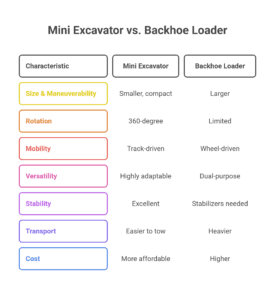In comparison with one another, the earthmoving and digging tasks that are better served by these two machines are the mini excavator and the backhoe. Both are constructed with the unique combination of their strengths and have distinct application habits; thus, the final decision on which one to use depends largely on the size of the job, working environment, and the versatility needed.
We discuss mini excavators vs. backhoes, the differences, the pros and cons, the applications, and the cost together, abiding by which one is the right fit for your construction or landscaping work.
What is a mini excavator?
A mini excavator, or a compact excavator, is essentially a scaled-down version of a regular hydraulic excavator. Thus, with a capacity of 1 ton to 6 tons, mini excavators are appliances that allow for light and moderate excavation work to be done in a small space.
Key Features:
- Full 360-degree rotation
- Small size suitable for narrow spaces
- High digging accuracy
- Additional accessories make it more functional
- Suspension with tracks for higher stability
What is a Backhoe?
The multi-purpose machine, a backhoe loader, which is often simply referred to as a backhoe, includes a digging bucket at the rear and a loading bucket at the front. Thus, a loader and a backhoe in one, this machine is very versatile and may find easy use not only in construction but also in agriculture.
Key Features:
- Embracing the two functions in one unit (loader + excavator)
- Wheeled mobility permits the easy journey along the road
- Fork for lifting, arm for excavation at the rear
- Used primarily in the country or in mixed areas
Mini Excavator vs Backhoe: Key Differences

Pros and Cons of Mini Excavators
✅ Pros:
- Compact & Lightweight: Perfect for working in confined areas such as backyards or urban spaces.
- 360° Slew Radius: Enables complete rotation without needing repositioning.
- Less Ground Damage: Tracks distribute the weight more evenly.
- Easy Transport: Can be carried by smaller trailers or trucks.
- Wide Attachment Compatibility: Fantastic for trenching, breaking, augering, and more.
❌ Cons:
- Lack of a Front Loader Bucket: A separate machine is required
- Not Ideal for Road Travel: It can’t be driven between job locations.
- Lower Digging Depth: In comparison to the bigger machines, depth is restricted.
Pros and Cons of Backhoes
✅ Pros:
- Machine With Dual Functions: Integrates not only the excavator but also the loader functions.
- More Speed on the Road: Without a trailer, it is simply transported from one job site to another.
- Works Well in Large Projects: Strong and multifunctional.
- Deepened Digging: Some models have longer arms.
❌ Cons:
- Larger and Heavier: It can be difficult to use in small or indoor areas.
- Restricted Non-Ambient Movements: The backhoe arm is not allowed to rotate fully.
- Cause Heavy Ground Impacts: Difficult to be controlled and made of durable material with high wear on the ground as a result of its heavy weight.
- Be More Expensive: They usually find higher purchases and maintenance costs.
Applications: When to Use a Mini Excavator
Mini excavators always win when the job at hand needs to be done precisely, with compactness and mobility in a tight space. A mini digger will be perfect for:
- Digging trenches for irrigation or utilities
- Landscaping or installing pools in the backyard
- Indoor demolition or remodeling
- Digging the foundation of the fence post or deck
- Small scale constructions
- Working in close proximity to buildings or walls
The fact that they can pass through a gate or a narrow way makes them the best selection for residential and urban contractors.
Applications: When to Use a Backhoe
Backhoes, in general, are the machines for employing heavier, more varied tasks, especially when traveling between sites and loading materials are required. So a backhoe is what you should go for:
- Loading and unloading material
- Grading or roadwork
- Farm or agricultural work
- Digging deep trenches or footings
- Large-scale excavation projects
- Municipal or utility work over long distances
Backhoes are typically located at a bigger job site where both digging and handling of the material are required.
Cost Comparison
➤ Mini Excavator Cost:
- Purchase Price (New): $25,000 – $60,000 USD
- Rental (Daily): $200 – $400 USD
- Operating Cost (Fuel/Maintenance): Lower
➤ Backhoe Loader Cost:
- Purchase Price (New): $70,000 – $120,000 USD
- Rental (Daily): $300 – $600 USD
- Operating Cost: Higher due to size and dual functions
Verdict: Mini excavators are more affordable both upfront and for long-term use, especially for smaller contractors or residential projects.
Attachment Compatibility
While both machines are compatible with a wide range of attachments, mini excavators generally provide quicker switching and more extensive hydraulic compatibility.
Mini Excavator Attachments:
- Trenching buckets
- Hydraulic breakers
- Augers
- Rippers
- Grapples
- Brush cutters
Backhoe Attachments:
- Loader buckets (various sizes)
- Forks
- Snowplows
- Brooms
- Hydraulic hammers
Ease of Operation
Mini Excavator:
- Easy for beginners to learn
- Joystick controls
- Precision maneuvering in confined areas
Backhoe:
- Needs operator experience and skill
- Dual-operation complexity (loader & backhoe)
- Bigger learning curve
If you’re a DIYer or a first-time operator, mini excavators will be your gentler way to earthmoving machinery.
Environmental Impact & Surface Disturbance
Mini excavators are:
- Quieter
- More fuel-efficient
- They don’t disturb the ground as much
So, mini excavators are almost perfect for the eco-sensitive areas or residential neighborhoods. Due to heavier nature, backhoes may cause more soil compaction and thus, make the lawn and other soft surfaces unsuitable for use.
Mini Excavator vs Backhoe: Quick Decision Guide

Final Thoughts: Which Machine Should You Choose?
The choice between a mini excavator and a backhoe comes down to what your job is, how much space you have, and how much money you can
- In the event that you require a heavy-duty machine that is capable of performing two different tasks namely, excavation and material loading on job sites, then it would be wise to go for a backhoe.
In the case that you want to work in small or city areas and only need one function, mini-excavators are generally more suitable for the job. Backhoes are like a charm for you when it comes to extensive projects in the countryside or infrastructure works.
Frequently Asked Questions (FAQs)
Is a mini excavator cheaper than a backhoe?
It is indeed so. Between a mini excavator and a backhoe, the operating cost (purchase, rent, and maintenance) of the first is significantly less than that of the latter.
Can a mini excavator replace a backhoe?
If the work is light, a mini-excavator can do it; however, for works that require both digging and loading, it is more practical to use backhoes due to their higher flexibility.
Which machine is easier to operate?
Mini excavators are much easier to handle and operate, especially when it comes to newbies and DIYers.
Which machine has a smaller footprint?
In terms of size, mini excavators are smaller, and they are perfect for the areas with limited space.
Ready to Choose?
Whether you are a contractor, landscaper, or site manager, the decision to select the most suitable equipment for you is not only necessary for your productivity but also for your safety. If after this, you still feel uncertain, then ask for both machines on a short-term hire and compare them in actual working conditions.
Would you like expert advice on the right machine for your job site? Get in touch with us now for a consultation or get a quote today!